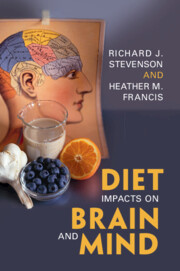Book contents
- Diet Impacts on Brain and Mind
- Diet Impacts on Brain and Mind
- Copyright page
- Contents
- Figures
- Tables
- Preface and Acknowledgements
- Chapter 1 Introduction
- Chapter 2 Pregnancy, Infancy and Development
- Chapter 3 Acute Effects of Food Intake
- Chapter 4 Chronic Effects of Food Intake
- Chapter 5 Dietary Neurotoxins
- Chapter 6 Neuroprotective Effects of Diet
- Chapter 7 Food-Related Drugs and Food as a Drug
- Chapter 8 Starvation and Caloric Restriction in Adults
- Chapter 9 Essential Nutrient Deficiencies in Adults
- Chapter 10 Implications and Conclusions
- References
- Index
Chapter 4 - Chronic Effects of Food Intake
Western-Style Diets
Published online by Cambridge University Press: 02 February 2023
- Diet Impacts on Brain and Mind
- Diet Impacts on Brain and Mind
- Copyright page
- Contents
- Figures
- Tables
- Preface and Acknowledgements
- Chapter 1 Introduction
- Chapter 2 Pregnancy, Infancy and Development
- Chapter 3 Acute Effects of Food Intake
- Chapter 4 Chronic Effects of Food Intake
- Chapter 5 Dietary Neurotoxins
- Chapter 6 Neuroprotective Effects of Diet
- Chapter 7 Food-Related Drugs and Food as a Drug
- Chapter 8 Starvation and Caloric Restriction in Adults
- Chapter 9 Essential Nutrient Deficiencies in Adults
- Chapter 10 Implications and Conclusions
- References
- Index
Summary
This chapter examines the impacts of consuming a Western-style diet (WS-diet), rich in saturated fat, sugar and salt. Animal and human data convincingly show that a WS-diet causes hippocampal and prefrontal cortical impairment. Determining which component of a WS-diet is responsible is not currently clear. Several mechanisms may underpin these adverse effects on the brain: (1) reductions in neurotrophic factors; (2) neuroinflammation; (3) oxidative stress; (4) increased stress responsivity; (5) selective vulnerabilities in the hippocampal blood-brain barrier; and (6) changes to gut microbiota. The last one is intriguing as gut microbiota changes may impair the gut endothelial barrier allowing gut material to leak into the bloodstream, subsequently affecting the brain. Eating a WS-diet has also been linked to poorer mental health (anxiety/depression), it may exacerbate multiple sclerosis, and increased risk for Alzheimer’s and Parkinson’s disease. Finally, obesity may be a consequence of these adverse neural changes, leading to appetitive dysregulation and overeating.
Keywords
- Type
- Chapter
- Information
- Diet Impacts on Brain and Mind , pp. 107 - 125Publisher: Cambridge University PressPrint publication year: 2023

